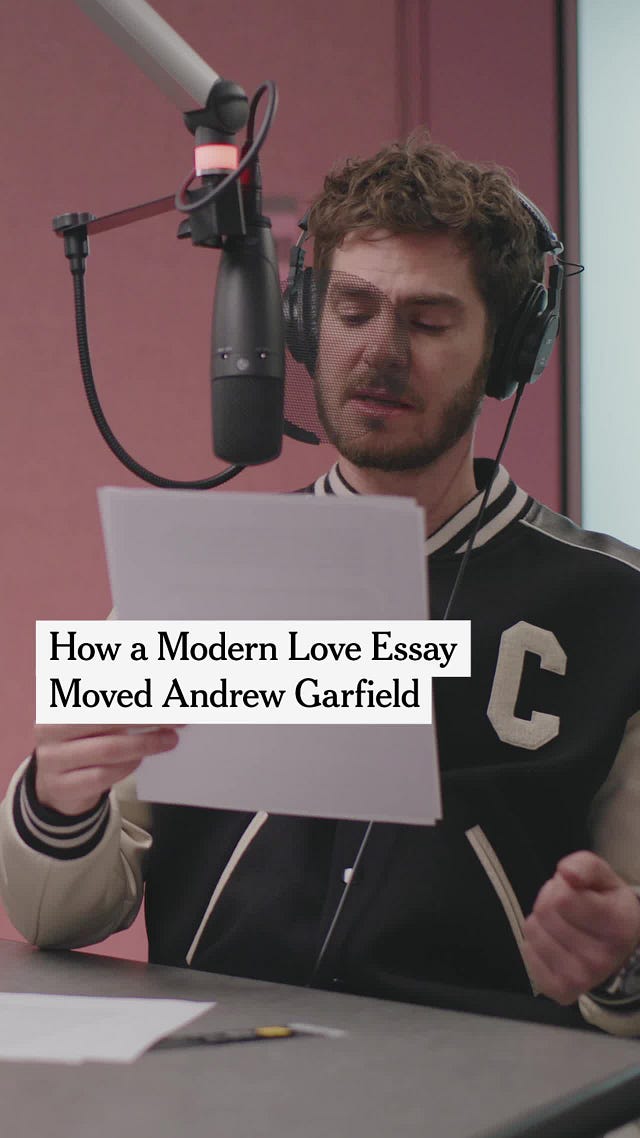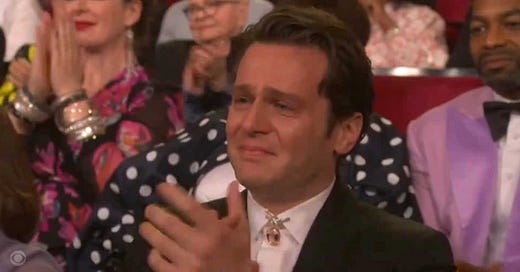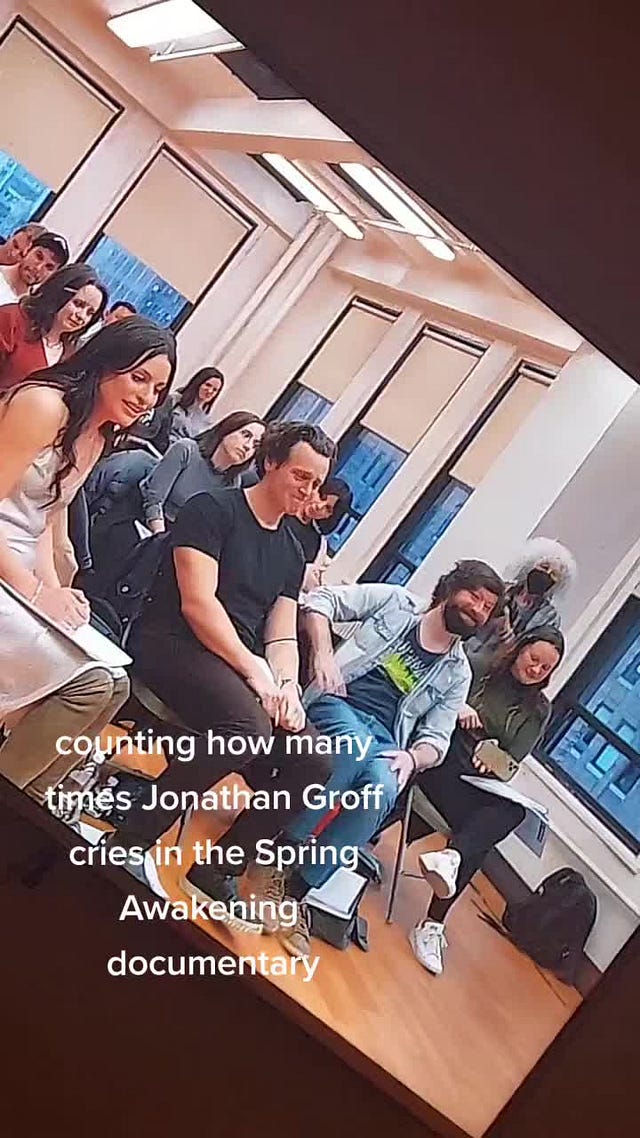I Can't Stop Thinking About Jonathan Groff's Tears
The actor, known for crying in public, gives me permission to accept my own deep emotions.
Jonathan Groff made me cry on the subway.
He didn’t mean to, of course. But I was reading his The New Yorker interview in which he recounted his two-decade career that began upon moving to New York City. When the interviewer asked how he was different from the 19-year-old who first moved to the city, here is how Groff responded:
[He bursts into tears.] I can’t tell why I cry!
When I read those words, I was moved to tears too. Thank goodness I was wearing a mask, which spared me from showing my messy emotions on public transit. As someone who also moved to New York City twenty years ago, I understood the gamut of emotions when thinking back on a life and career defined by this city.
Yet I also saw in Groff a kindred spirit. Because the interview also demonstrated what the actor is known for besides his prodigious talent: his propensity for crying.
I am constantly bursting into tears too. So much can set me off: kind words, mean words, award show speeches, pop songs. What makes it worse is when it catches me off guard. For example, I have seen three Broadway shows this year. And each time the show ended—when the orchestral music swelled, the beaming actors took their bows, and the audience applauded—I was overwhelmed to the point of tears.
But to quote Groff, “I can’t tell why I cry.”
A few months ago, our kitchen sink had a leaky faucet. Any time it was turned on, even incrementally, jets of water would spurt spectacularly into the air like the Bellagio Fountain. Washing one dish would cause a mini flood in our kitchen.
I am that leaky faucet, just a hair-trigger away from going from trickle to waterfall. When the faucet was fixed, I wished there was as simple a solution to solve my uncontrollable emotions.
Because for as long as I can remember, I have berated myself for feeling too much. Get it together, I have said over and over. Get a grip. I’ve always yearned for the ability to dam off my feelings as easily as flicking a switch from “on” to “off.” Once I became an author, my anxiety about my inability to control my emotions became more acute. And I was right to feel that way.
I have now cried twice at book events in front of an audience.
The first time it happened, I was giving a reading from my novel, and a memory from my childhood hit me in an unexpected way. The second time was when an interviewer asked me about an essay I had written about my late grandfather.
It’s incredibly mortifying to find yourself overcome in front of large group of people. Everyone was always so kind and gracious afterwards, but as the person with the tear-stained face and the quivering chin, all I could feel was shame.
I see myself so much in this interview with Groff about his role in Broadway’s Merrily We Roll Along. How in recalling a memory about his connection to a song, the power of those emotions engulfs him. His bewilderment as this happens—“oh my god, I’m a fucking mess”—is all too relatable.
I’m pretty sure that I would have remained ashamed of my own propensity for tears if not for a conversation with a friend. After she shared a personal story with me, I was deeply moved when hearing about what she had endured, and how that hardship made her grateful for what she has now. I felt the waterworks come on, and immediately started apologizing.
Then my friend told me something that her young daughter had told her: “Crying is a superpower.”
As a writer—and really, as a woman—I’m often cataloging all the ways which I am deficient, and all the ways I can be better. But to hear the word “superpower” was the spark I needed to reframe what I’ve always thought of as one of my biggest weaknesses.
After this conversation, I thought again about Groff. Specifically, about how because he is known for his susceptibility to crying, he gets constantly asked it about in interviews, no more so than this year, when he was won his first Tony Award for Merrily We Roll Along.
It can’t be easy knowing that everyone from good friends like Lea Michele to fans who make YouTube compilations see you through the lens of “yeah, he’s a crier.” But while in the moment he might find it embarrassing, he also has a sense of humor about it as shown in interviews like this one with Late Night with Seth Meyers. If anything, the fact he can make his weepiness part of his late-night talk show fodder demonstrates that he has made peace with it.
Andrew Garfield is another actor known for his sensitivity, particularly his eloquence in discussing his grief for his late mother. Recently, a clip of him went viral while recording the New York Times Modern Love podcast.
He became choked up while narrating a “Modern Love” essay upon saying the words, “my parents no longer drive at night.” When asked why he was tearing up, Garfield didn’t seem to fully know, calling it “mysterious.”
But like Groff, he didn’t evince any sense of humiliation over the act of crying. Garfield made it clear that it was a natural reaction to connecting with something deeply. About his reaction to the essay, he said:
“This is why art is important. Because it can get us to places we can't get to any other way.”

 Tiktok failed to load.
Tiktok failed to load.Enable 3rd party cookies or use another browser
Crying can be a superpower. But for me, it works better to think of it as a badge of honor, because becoming emotional so easily proves that I am always deeply attuned to heartbreak, gratitude and joy.
What I know for sure is that art is the real superpower. Because if I think about what makes me cry and Jonathan Groff and Andrew Garfield cry, the impact of creating art and experiencing art is what drives us to tears, time and time again.
We’re in the same club, and I’m no longer contrite about being a member.
Ministry Book Corner 📚
Here at MOPC, not only are we pop culture writers, we’re also authors! Every Monday, we’re going to recommend each other’s work. And if you’d like to check out all of our books, visit our bookstore at Bookshop.org.
Jennifer Recommends … Saul’s Kind Of a Big Deal: How Anchorman Stayed Classy and Became the Most Iconic Comedy of the 21st Century
I’ll be honest: I wasn’t necessarily pining for a book about Anchorman. But I will read Saul’s take on anything, and somehow even more so when it’s about something I wouldn’t have otherwise taken seriously as a book subject. Here, he’s particularly in his element, given his deep expertise in comedy and film history.
Is it fun to dive deep on the truly astounding fight sequence when all of San Diego’s news teams face off in a shockingly violent confrontation? Yes. Or to read about the film’s other tour de force, Will Ferrell, David Koechner, Paul Rudd, and Steve Carrell harmonizing for much longer than you think they’re going to on “Afternoon Delight”? Absolutely.
But what I most appreciated was the ways that Saul demonstrated the 2004 film’s complicated relationship with feminism, masculinity, and 21st century politics. It’s either a very feminist movie, highlighting what female TV news pioneers like Jessica Savitch went through. (Saul dedicates a chapter to these real-life women’s history and the ways they were reflected in Christina Applegate’s character.) Or it’s a touchstone for toxic masculinity, a factor he doesn’t shy away from in an otherwise loving tribute to a truly funny movie; he shows the ways that Ferrell’s Ron Burgundy has been (willfully?) misinterpreted not as a buffoon but a role model for masculinity on the extreme right. Kind Of a Big Deal is the exact combination of fun and smart that I want from my pop culture books.








Crying is a superpower! This is going to stick with me. :)
This is such a beautiful essay, Kirthana, and my goodness how beautiful and powerful is this:
"As a writer—and really, as a woman—I’m often cataloging all the ways which I am deficient, and all the ways I can be better. But to hear the word “superpower” was the spark I needed to reframe what I’ve always thought of as one of my biggest weaknesses."